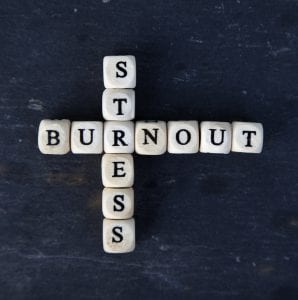More than your Diagnosis – Differentiating Between Mental Illness and Burnout

In recent months, I have noticed an increasing trend in some of my more “acute” clients. These are people who have been in therapy on and off for several years and have come to terms with their various diagnoses. They are actively committed to the treatment plan and are moving towards health.
The trend that I have noticed is called burnout. When stress and struggles begin at work, these clients may have difficulty differentiating between whether their mental illness or burnout is contributing to their troubles.
The ability to differentiate between these two shows a great deal of growth and healing. Identifying this difference means acknowledging that they feel off emotionally, mentally, or physically but they are unable to figure out where exactly these feelings are coming from.
What I like to do with my clients first is normalize burnout. I like to describe the difference between burnout and stress. Everyone experiences stress in some form or fashion, but burnout can look and feel completely different. It’s important to focus on how burnout impacts us and what we do with it.
There are ten main symptoms I look for when trying to identify burnout. They are:
- Severe exhaustion. Having difficulty getting up in the morning. Most activities feel as though they require an extra amount of energy or effort.
- Lack of motivation. Trouble feeling enthusiastic about anything or have difficulty coming up with motivation for your work.
- Excessive workload. When the workload is overwhelming and there is little to no time to recover this causes stress to build up.
- Not taking care of yourself. Oftentimes when people become very overwhelmed, they have difficulty keeping their regular routine. They may cut out physical exercise, balanced eating, or they may have trouble sleeping.
- When everything feels pointless and there is difficulty experiencing a sense of accomplishment. We may focus on the negative such as resentments we have about the job or the place in which we work.
- Emotionally draining work. If your work requires a lot of emotional energy and there’s nothing to replenish these resources, it can result in physical fatigue.
- Catastrophic thoughts. When we are burnt out, it can lead to dire thinking. It may sound something like, “I can’t do this anymore” or “Why bother?”
- Lack of rewards. If you go above and beyond in your workplace and there are no rewards or a seeming lack of support, it can cause resentment and exhaustion.
- Interpersonal problems at home and work. If you notice that you are having more conflict with people, this could be a sign. Or if you notice that you are beginning to withdraw from others.
- Being preoccupied with work, outside of work. If you have difficulty shutting your mind off and you continually think about various work problems that need to be solved.
When these symptoms are present, I like to consider burnout as an option. At the same time, I am evaluating whether or not my clients are sticking to the following guidelines:
- Making sure they are medication compliant- that they are taking their medication as prescribed by their psychiatrist and that they are addressing any potential side effects.
- Continuing to meet with their therapist and psychiatrist regularly, as outlined in their treatment program. Notice and discuss any unusual or concerning symptoms that may be presenting themselves.
- Maintaining healthy sleep hygiene, exercising regularly, attending to physical ailments, avoiding mood altering substances, and eating a balanced diet.
If they are, then odds are its burnout. I like to shift the focus to maintaining what they are currently doing but adding in some additional forms of self-care. This may include: building up more positive events; reengaging with their support system; or setting boundaries, where necessary, at work or home.
If you think you may be struggling with burnout, are having difficulty identifying your stressors, or how to manage them, I would encourage you to set an appointment with a therapist. They can help provide you with the essential tools or resources you may need.
